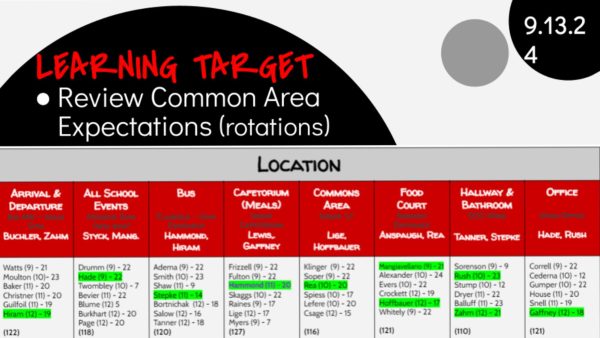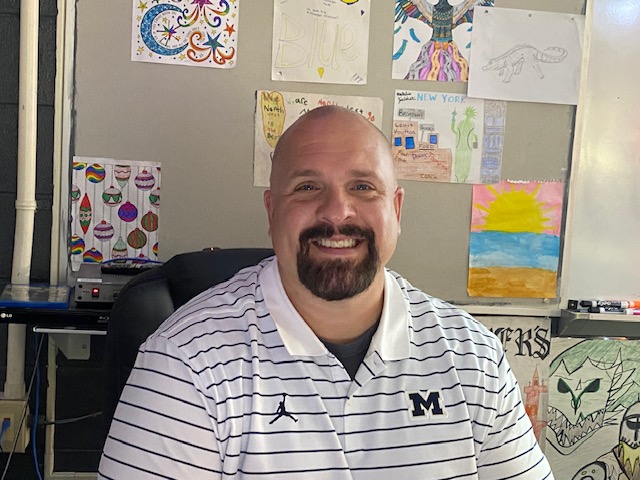Positive Behavior Interventions and Support rotations, or PBIS stations, are a large part of the back-to-school protocols at Northwest High School (NWHS). Although intended for reiteration, these stations have sparked conversation over how redundant it feels to Juniors and Seniors.
As mentioned earlier, the PBIS rotation is intended to reinforce behavioral expectations at locations such as the hallway, cafetorium, food court, and the commons, posing as a reminder to students who may need a refresher after summer vacation.
While most of the student body agrees this program benefits Freshmen and Sophomores transitioning to high school, it leaves Juniors and Seniors, who also have to engage in these stations frustrated.
In an attempt to compromise, students identified the issues encompassing the school requiring PBIS coverage. Several upperclassmen, such as Senior Ava Golightly, started to discuss the issues in the cafetorium.
“There is a lot of horseplay going on in there,” said Golightly.
She adds that this misbehavior is typical for Freshmen, supporting that PBIS should be required to correct misconduct for this grade level.
Golightly also offers an alternative to PBIS.
“In middle school, they made videos on what to do and what not to do,” said Golightly. “Everyone enjoyed those.”
English teacher John Rea is a speaker for the program and presented a positive outlook on the rotations.
According to Rea, the biggest behavioral problem among students, based on information that the administration provides, is excessive technology use such as phones and smartwatches.
“That is what always pops up on the data they show us,” said Rea.
Despite the issue, Rea sees these rotations positively impacting students and changing their behaviors. He sees PBIS rotations as necessary for students and an effective use of time.
Assistant Principal and District Representative Amanda Anspaugh was a part of the group that first created PBIS, and plans to continue this tradition with all students.
From her experience, the most frequent minor issues from students are personal device violations and tardies. Overuse of technology has led to a more strict policy this year, with the disallowance of phones in bathrooms and locker rooms. Moreover, phones must be out of sight during instructional time.
Major instances such as academic dishonesty, particularly regarding the use of Artificial Intelligence (AI), bomb threats, and false alarms have also increased over the years.
“However, from the administrative perspective [of major behavioral issues], it is one hundred percent what is happening in the bathrooms,” said Anspaugh.
Furthermore, PBIS intends to decrease the amount of behavioral issues altogether.
“We treat teaching behavior like we treat teaching math,” said Anspaugh. “Once we see the biggest issue in a certain location, we reteach. If you do not understand slope-intercept form in math and your class fails the math test, your teacher must stop and reteach the subject. It is the same concept.”
Following these teachings, Anspaugh finds it crucial for upperclassmen to be retaught these expectations each year, as they serve as a visual representation of what the expectations should look like for the underclassmen.
“You are always modeling for the underclassmen what it should look like, feel like, and sound like to be respectful, responsible, kind, and hard-working,” said Anspaugh.
Since these teachings are repetitive and done at the beginning of each trimester, they can become redundant. Over the past three years, Seniors have gone through this process several times.
Anspaugh notes that posters should be displayed in each location to reduce repetitiveness. These posters can act as a visual aid and remind students of the expectations in a given area.
“One thing that I would like to see more of is our broadcasting students getting more involved in creating videos that will help us reteach,” said Anspaugh. “All I would have to do is go to Google and find that video that they have created if I was confused about any expectations.”
PBIS Rotations can be argued to affect the behavior of students positively. For example, teaching proper behavior can reroute how students behave in school, creating a more optimistic environment.
Anspaugh concludes that students only sometimes comply with these requirements, proving students’ lack of regard for the program.
Despite the student’s misbehavior prompting the reiteration of PBIS, having the same procedure displayed and expecting a new

result makes PBIS rotations inefficacious. Ultimately, no difference is made when upperclassmen are exposed to repeating rules.
Regarding the cancellation of PBIS for upperclassmen, participation is still required. With many opinions surrounding PBIS being closed-minded, it indirectly causes miscommunication between the students and staff.
As for the possibility of revisiting this topic, upperclassmen must demonstrate proper etiquette to prove to administrative staff that these programs are unnecessary for future Juniors and Seniors.




